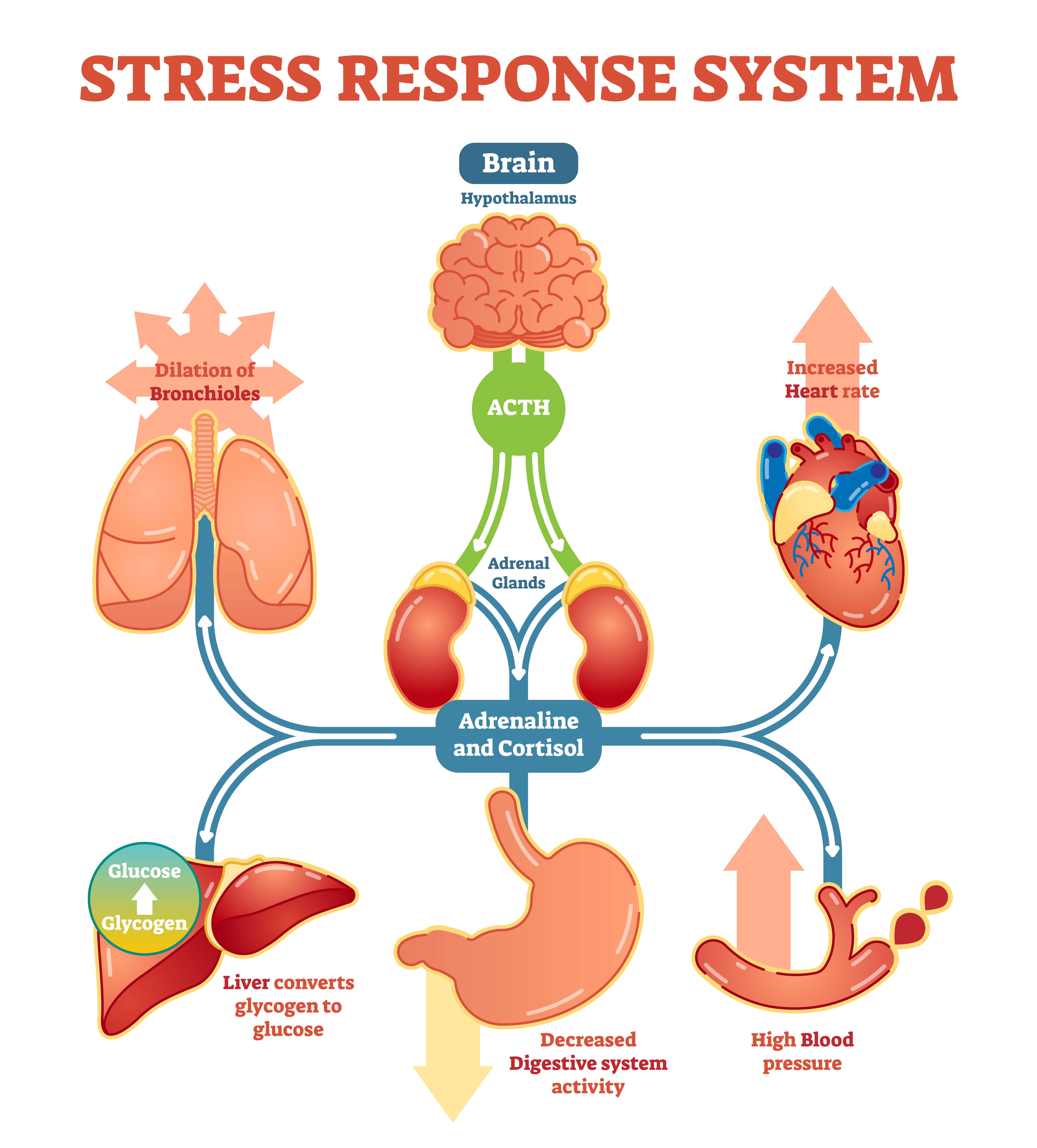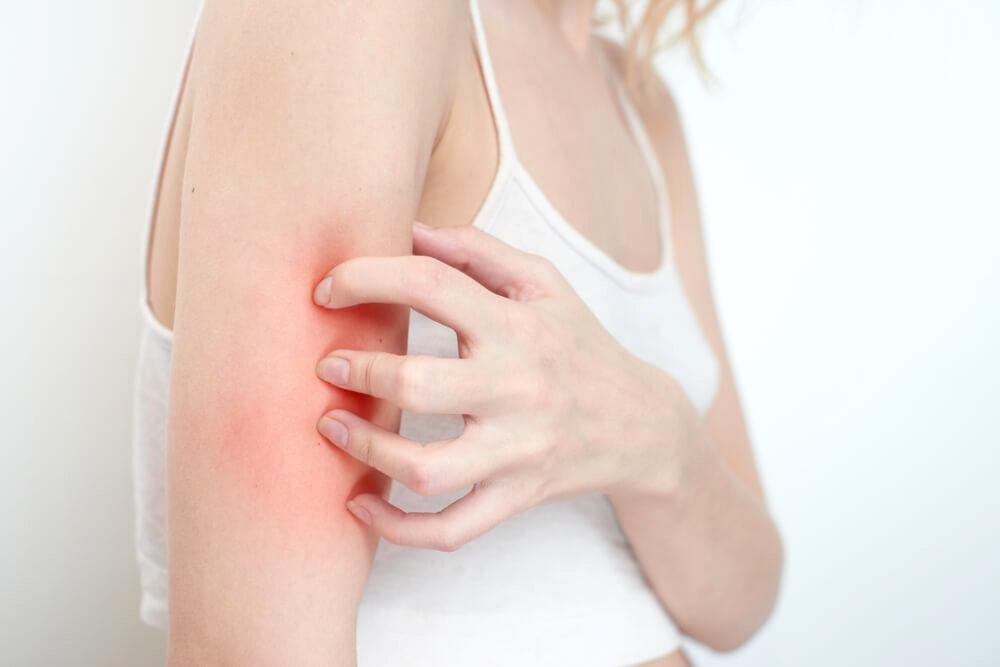Life is a delicate balance between the good and the bad. Your skin, being the biggest organ in the body gets a bigger share of these experiences. For example, a great skin care routine will shine through your skin and so will your party escapades or 16 hour work-shifts.
That said there is a close connection between your skin and the state of your body; if you are stressed, your skin suffers and if you are relaxed, it glows. This therefore serves as a caution; don’t let stress affect your skin!
To help you understand this even better, we have delved into the details on the connection between stress and your skin. We have included the tell-tale effects and of course, various measures to get rid of stress and save your skin in the process.
How Does Stress Affect Your Skin?
Your body has response mechanisms for different stimuli. Whether the stimulus is internal or external, a reaction will follow. When it comes to stress, the brain is intertwined with the skin.
In scientific terms this relationship is known as a psychodermatology – a field of study which postulates that emotions inherently affect the appearance and aggravate existing skin conditions.
So what’s the Science behind The Mind-Skin Connection?
A lot of nerve endings are found in the skin. This allows emotions that are played out neurologically to be expressed through the skin. Being the largest organ in the body and the fact that nerves wraps up around organs, it’s inevitable that your skin gets to react to changes in and around the body.
The same interconnection is responsible for increase in gastrointestinal upsets, anxiety or hypertension due to stress. When stress is introduced, the brain reacts by putting the body into a ‘flight’ or ‘fight’ mode.
This causes hormones and other chemicals to be released throughout the bloodstream. These compounds affect how the skin functions including its healing process.
Cortisol and Adrenalin
To cope with stress, cortisol and adrenaline are among the major hormones released in the body. These are meant to boost your energy while keeping you alert at the same time. In a nutshell, they help you keep stress at bay and give your body the kick to keep going.
Cortisol and adrenaline are released within the adrenal gland whenever your emotions are low or when experiencing low blood-glucose concentration. The hormones’ main functions include;
- Spiking energy levels for survival
- Increasing memory function
- Heightening immunity
- Decreasing sensitivity to pain
- Maintaining physiological balance
These are important functions to return your body into a relaxed state, except for one main reason:
Cortisol is Bad for Your Skin!
Have you noticed increase in acne breakouts when you are stressed? Well… blame it on cortisol. Also known as ‘the stress hormone’, cortisol harms your skin. This is especially true if it’s produced in high amounts over a long period of time.
Once released, the hormone puts skin glands on overdrive. What follows is the production of substances like sebum and other processes that greatly impair your skin’s health.
So exactly how bad is cortisol and stress on your skin?
Acne Breakouts
Acne is one of the major skin conditions that affect most people. Although it’s not caused by stress alone, acne can be worsened or triggered by emotions. Cortisol disrupts the production of other hormones which causes acne breakout on the face and other parts of your body.
The sudden spike of hormones is also known to deprive the skin of oxygen. It can also lead to decrease in nutrients reaching the organ. The overall effect of this is breakout of acne and impaired ability to fight off toxins in and on the skin.
As earlier noted, stress causes sebaceous glands to produce high levels of sebum; this is an oily substance which when deposited on the skin can clog pores, leading to bacterial development resulting in acne.
Rashes and Hives
The perfect balance between good and bad bacteria is important for a healthy body. Since your skin also serves as an excretory organ, when the bad bacteria end up on it, rashes and hives develop.
This can be occasioned by microbial imbalance in the gastrointestinal tract or in the skin. Also known as dysbiosis, this kind of microbial activity can be caused by anxiety, depression and stress and so on.
Dry Skin
When one is stressed, the skin’s ability to shed and stay hydrated is weakened. The lipid barrier, which is responsible for keeping moisture from evaporating, is reduced by stress. This allows your skin to lose moisture, drying it out in the process.
The resulting dry and flaky skin builds up giving you a dull complexion. Additionally, presence of cortisol decreases hyaluronic acid in the skin. This compromises the skin’s ability to stay hydrated since the acid is a natural moisturizer.
Increased Wrinkles and Fine Lines
With the release of cortisol comes increase in blood sugar levels. If this happens over a long period, it can cause emergence of diabetes. On the skin though, high sugar in the blood encourages glycation.
This is process that damages collagen and elastin in the skin. These are the very proteins tasked with reducing the appearance of wrinkles and fine lines. Depletion of these proteins also leads to a saggy skin and an aged appearance.
Itchiness, Scratching, Cuts and Bruises
Biting on nails, obsessing, or chewing hair, does that sound like a stressed you? These are some of the behaviors that people result to when their emotions take a hit. Other common stress-related habits include scratching and inflicting your skin with cuts and bruises.
In some cases you won’t even be aware when subjecting your skin to these bad behaviors. Additionally, these habits can lead to eczema-like rashes. This kind of behavior that targets the skin can be traced back to stress-induced release of histamine, an endogenous substance that evokes an itch.
How to Deal with Stress for Healthier Skin
Now that you know stress impacts negatively on the appearance and overall health of your skin, is there something that can be done? Lucky for you there is. Below are 10 ways of dealing with stress:
1) Get Enough Sleep
The energy in your body is not infinite, at some point it needs to be regenerated. Eating and drinking plenty of fluids will do the trick but without sleep you won’t be able to function. Devoid of sleep, your body will start shutting down and take a toll on most of your organs, skin included.
Ideally an adult should aim for 7 to 8 hours of sleep, especially after a stressful day. Stress can however cause insomnia hence the need for a routine or a ‘winding down’ time before bedtime.
Here is a working formula: Stop working, switch off your phone, listen to soothing music or read a book- and be on your way to some much needed beauty sleep.
2) Self Hypnosis
Hypnosis has been used as a therapeutic tool for centuries. With continued acceptance of alternative medicine, the technique is becoming an invaluable tool for mental related issues. With the right knowhow, you do not have to pay a therapist for the service; you can go the DIY way.
Self -hypnosis can take many forms including entering a state of deep trance or behavior modification. When in a trance or a deeply relaxed state, you can tune your subconscious into concentrating on the less stressful aspects of your life. For behavior modification, you can hypnotize yourself into sticking to a program or picking up a hobby.
3) Listen to Music
Do you have a go-to playlist? If so, that could be your way out of a stressful situation.
Since stress is a psychological response, redirecting your mind to something you love will keep bad vibes away. An even better de-stressing approach is to create music. Listening to, singing along or making music involves passion and mastery, none of which can be done on a burdened mind.
Studies have shown that listening to music before a stressor is introduced can be beneficial to your health. To a higher degree, faster recovery time is observed in the autonomic nervous system. Endocrine system which is responsible for the release of feel-good hormones also benefits from listening to music; the same goes for improved cognitive functions.
4) Eat Right and Stay Hydrated
Some people result to stress eating whenever things don’t go their way. This is not only bad for the skin but also for their overall wellbeing. If you fall into this category, then you need to rethink your coping mechanisms. If however you are stuck on eating, then you can make the good out of a bad situation by eating right.
For starters, avoid foods with low sodium levels. Lack of the mineral has been associated with fluid retention under the eyes and puffiness. Next, keep off caffeinated drinks, cigarettes and alcohol; these are known to dehydrate, inflame and deprive your skin of nutrients and vitamins.
Eating foods rich in vitamin C will also help in preventing effects of stress from showing on your skin. Go for green leafy vegetables and fruits which are laden with vitamin C, a great compound that rids your skin off free radicals and keeps it hydrated.
Lastly, remember to drink plenty of water. As earlier noted stress dries out the skin and deprives it of oxygen and nutrients. Keeping the organ hydrated will go a long way into countering these side effects.
5) Meditate and Try Yoga
One of the best ways of recentering after a difficult day is by practicing yoga and meditation. These are age-old techniques whose benefits have been explored by many societies the world over. Meditation helps in building resilience to stress while yoga counters the body’s stress response by helping you relax physically.
Meditating for at least 20 minutes will be enough to refocus your thoughts on to the good times. On the other hand, yoga takes a more holistic approach; it helps in controlling breathing, physical movement, mental imagery and ethical disciplines.
6) Have Sex
It’s a well-known fact that stress is among the major causes of low libido. That said, having sex is a good way to rejuvenate your mind and keep stress at bay.
A study on human behavior published by the Arizona State University shed more light on this. In a pool of 58 women, sexual behaviors, mood ratings, stressful events and physical affections were recorded for a period of 36 weeks.
From the results, the study concluded that, “sexual interaction and physical affection improve mood and reduce stress, with improved mood and reduced stress in turn increasing the likelihood of future sex and physical affection.”
There is no need to say more; take the cue, do the necessary and watch your skin glow!
7) Take Up Journaling
A simple way of countering the negative effects of bad work day is by journaling. This entails keeping a journal or diary of things that are happening in your life. When taken up as a stress management tool, journaling should be focused on exploring your emotions.
This will allow you to process your thoughts and feelings, giving you back control of your life. It’s also a way for you to remunerate and recognize the good that is happening in your life. Also, it gives you a chance to relive the good times. A record of previous bad experiences can also be handy in helping you find solutions to your current predicaments.
8) Do What You Love
It goes without saying that you can’t be stressed and be doing something you love at the same time. This simple fact gives you a straightforward way out of your bad moods: Whenever you are at a crossroad and nothing seems to work, try and switch your energy to something you love.
This will not only rest your mind but it also helps in releasing endorphins, the feel good hormones. These hormones have been associated with the body’s internal mechanism of dealing with stress; anything you can do boost their release is welcome for your skin’s health.
9) Exercise
Hitting the gym, jogging, swimming, running, and taking power walks are some of the exercises necessary for relaxation. Exercise promotes circulation of blood in the skin. This ensures that your skin stays oxygenated, nourished and vibrant.
Increased blood flow also helps in flushing out toxins and cellular debris from the skin. Exercise also keeps endorphins flowing throughout your body, combating mood swings and keeping you happy.
10) Don’t Neglect Your Skin
When all is said and done, stress is a factor of many things, some of which you have no control over. Take for example working in a cut-throat job, you are bound to be stressed every once in a while. Such a scenario calls for taking better care of your skin. This is where skin care products come into play.
Choose a skincare routine aimed at hydrating and keeping your skin nourished. Avoid products with harmful ingredients such as steroids and hydroquinone – while such products are known for treating different skin conditions, continued use and in high concentrations can be counterproductive.
If you see stress anywhere, look for bad skin close by! Simply put, the two go hand in hand. Your brain and skin are closely connected and so whatever affects the brain negatively gets to be relayed to the skin. While stress is sometimes inevitable, there are numerous ways to reduce it. This will consequently save your skin some bad experiences.
If you have been feeling stressed lately, don’t wait for the red flags, go ahead and do something about it. On the other hand, if stress is already ruining your skin, it is never too late to redeem your look.










Leave A Comment